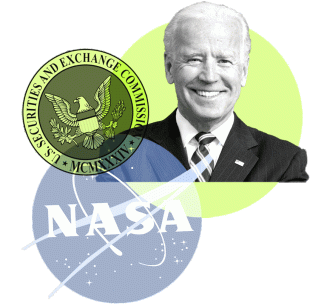A short-run weekly newsletter analyzing federal climate action during the first months of the Biden administration.
Happy Friday! I’m Emily Pontecorvo, and today is Day 17 of the Biden administration. This week, President Biden’s “whole of government” approach to climate change began to come into focus.
President Biden has slowed his roll on announcing big, splashy policies to take on climate change. But while every day can’t be Climate Day in the White House (like it is here at Grist), there’s plenty of evidence that the new administration will consider the overheating planet in every aspect of policymaking.
Following Biden’s move to hire Cabinet-level climate advisors, John Kerry and Gina McCarthy, he seems to be installing climate czars in every agency. On Monday, Biden’s Securities and Exchange Commission announced it was hiring a policy advisor focused on climate change and environmental, social, and corporate governance. The move followed the creation of similar positions at the Federal Reserve and the Treasury — which reflects how Wall Street and their regulators increasingly consider climate change a financial risk. Less startling was NASA, the agency whose satellites are key to helping the U.S. monitor emissions and track the effects of climate change, announcing Wednesday that it was bringing on its first-ever senior climate advisor. File that under “Long Overdue.”

Biden’s “whole of government” approach is trickling down to the Senate, where Democratic Majority Leader Chuck Schumer asked his caucus to pursue a “whole of Senate” approach to the climate crisis and told the chairs of “all relevant committees” to hold hearings on the issue. We could soon see legislators in the Banking, Housing, and Urban Affairs Committee discuss redlining’s impact on a community’s exposure to extreme heat, or hear the Subcommittee on Border Security and Immigration take up protections for climate refugees.
And then there are Biden’s Cabinet picks. The Senate confirmed Pete Buttigieg as head of the Department of Transportation on Tuesday. In his confirmation hearing, the former presidential contender told the Senate Commerce Committee that the country has a “unique window of opportunity” for investing in infrastructure and addressing climate change at the same time. While Buttigieg can’t build Biden’s 500,000 electric vehicle charging stations without billions of dollars from Congress, he can create grants to help cities and states design transit projects that reduce car travel and help craft new vehicle emission standards.
Biden’s executive team is already getting started on those standards. McCarthy told Reuters that the White House has begun to meet with major automakers. That includes General Motors, which, in case you missed it, is suddenly concerned America is losing the race on electric vehicles.
But Wait … There’s More.
A federal judge in Montana tossed out the Trump Administration’s “Secret Science” rule — after prodding from Biden’s team. The rule limited the scientific evidence the Environmental Protection Agency was allowed to consider in crafting regulations.
Offshore wind now has a friend in the White House. The Bureau of Ocean Energy Management’s new director, Amanda Lefton, said Wednesday that the agency would resume permitting for Vineyard Wind, the first large-scale offshore wind project in the U.S. Trump had terminated the project’s application late last year.
John Kerry represented the U.S. at the first global summit on adaptation last week. Kerry pledged to repay the $2 billion the U.S. owes to the United Nations-backed Green Climate Fund, which helps developing countries pay for climate projects like solar and wind farms or resilient water infrastructure.



